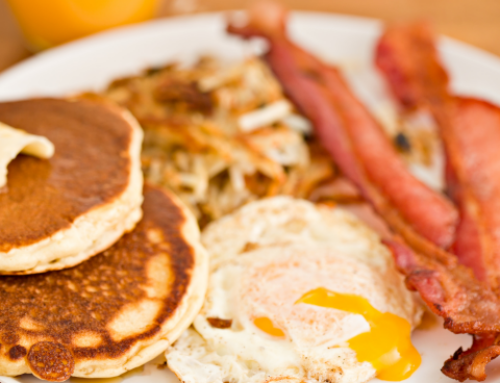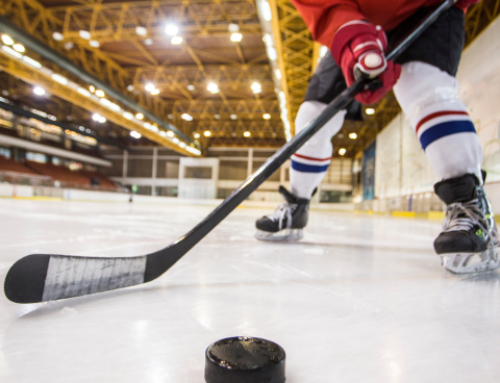Maintaining muscle mass and body weight during long and grueling pre-season practices and scrimmages can be difficult for football players. Chances are, they burn more calories than they consume, but the last thing they need is to lose muscle gained from countless hours in the weight room during the off-season. Losing body fat is great, but losing muscle can impair on-field performance.
Follow these six muscle-building nutrition tips to enhance recovery between practices and games, both before and during the regular season.
1. Take in Calories Early With a Big Breakfast
Start the day with a large breakfast of muscle-building protein mixed with nutrient-dense and energizing carbohydrates and healthy fat. Allow at least two hours to digest the meal before hitting the field. Samples of high-calorie breakfasts:
Eggs and toast
- Two eggs
- Two glasses of whole milk
- Two slices of whole grain toast with natural peanut butter
- A banana
Breakfast Smoothie
- A high-protein/high-carb smoothie containing a cup of plain yogurt, two cups of chocolate milk, 1/4 cup of chopped almonds and 1/4 cup of crushed, dried cherries.
- Blend ingredients and take your time drinking this dense-calorie nutritious beverage.
Bonus: Almonds and cherries have anti-inflammatory compounds for reducing muscle and joint soreness following sports and exercise.
2. Eat High-Calorie Protein and Carb Snacks
Immediately after practice or a game, eat a high-calorie, protein-rich snack of nuts and high-carb/high-calorie dried fruits (e.g., raisins, dried apricots, dried cherries and prunes) to help repair and rebuild your muscles.
3. Stay Hydrated
Athletes lose water weight, especially when practicing in hot and humid conditions. Muscles are primarily composed of water, so staying hydrated is extremely important. Drink water before, during and after practices and games, and eat plenty of water-based fruits and vegetables to maintain weight and remain hydrated.
4. Have Protein With Every Meal for Muscle Repair and Growth
Eggs, seafood, milk, yogurt, cottage cheese, cheddar cheese, nuts, seeds, poultry, meat, beans—these protein-rich staples are necessary not only to help you build muscle with weight training during the off-season, they are also essential to maintain that muscle during the season.
5. Eat Healthy High-Calorie Fats
Healthy fats supply energy and are rich in calories to help preserve muscle weight during the course of a long season. Olive oil, avocados, nuts, seeds and seafood all contain healthy fat you should eat daily.
6. Don’t Neglect Starchy Carbs for Energy and Calories
Eat potatoes, yams, whole grain toast and cereals, brown rice, and whole wheat or regular pasta. These foods not only supply energy for practices and games, they also provide additional calories to help maintain weight.
Read more:
RECOMMENDED FOR YOU
MOST POPULAR
Maintaining muscle mass and body weight during long and grueling pre-season practices and scrimmages can be difficult for football players. Chances are, they burn more calories than they consume, but the last thing they need is to lose muscle gained from countless hours in the weight room during the off-season. Losing body fat is great, but losing muscle can impair on-field performance.
Follow these six muscle-building nutrition tips to enhance recovery between practices and games, both before and during the regular season.
1. Take in Calories Early With a Big Breakfast
Start the day with a large breakfast of muscle-building protein mixed with nutrient-dense and energizing carbohydrates and healthy fat. Allow at least two hours to digest the meal before hitting the field. Samples of high-calorie breakfasts:
Eggs and toast
- Two eggs
- Two glasses of whole milk
- Two slices of whole grain toast with natural peanut butter
- A banana
Breakfast Smoothie
- A high-protein/high-carb smoothie containing a cup of plain yogurt, two cups of chocolate milk, 1/4 cup of chopped almonds and 1/4 cup of crushed, dried cherries.
- Blend ingredients and take your time drinking this dense-calorie nutritious beverage.
Bonus: Almonds and cherries have anti-inflammatory compounds for reducing muscle and joint soreness following sports and exercise.
2. Eat High-Calorie Protein and Carb Snacks
Immediately after practice or a game, eat a high-calorie, protein-rich snack of nuts and high-carb/high-calorie dried fruits (e.g., raisins, dried apricots, dried cherries and prunes) to help repair and rebuild your muscles.
3. Stay Hydrated
Athletes lose water weight, especially when practicing in hot and humid conditions. Muscles are primarily composed of water, so staying hydrated is extremely important. Drink water before, during and after practices and games, and eat plenty of water-based fruits and vegetables to maintain weight and remain hydrated.
4. Have Protein With Every Meal for Muscle Repair and Growth
Eggs, seafood, milk, yogurt, cottage cheese, cheddar cheese, nuts, seeds, poultry, meat, beans—these protein-rich staples are necessary not only to help you build muscle with weight training during the off-season, they are also essential to maintain that muscle during the season.
5. Eat Healthy High-Calorie Fats
Healthy fats supply energy and are rich in calories to help preserve muscle weight during the course of a long season. Olive oil, avocados, nuts, seeds and seafood all contain healthy fat you should eat daily.
6. Don’t Neglect Starchy Carbs for Energy and Calories
Eat potatoes, yams, whole grain toast and cereals, brown rice, and whole wheat or regular pasta. These foods not only supply energy for practices and games, they also provide additional calories to help maintain weight.
Read more:












